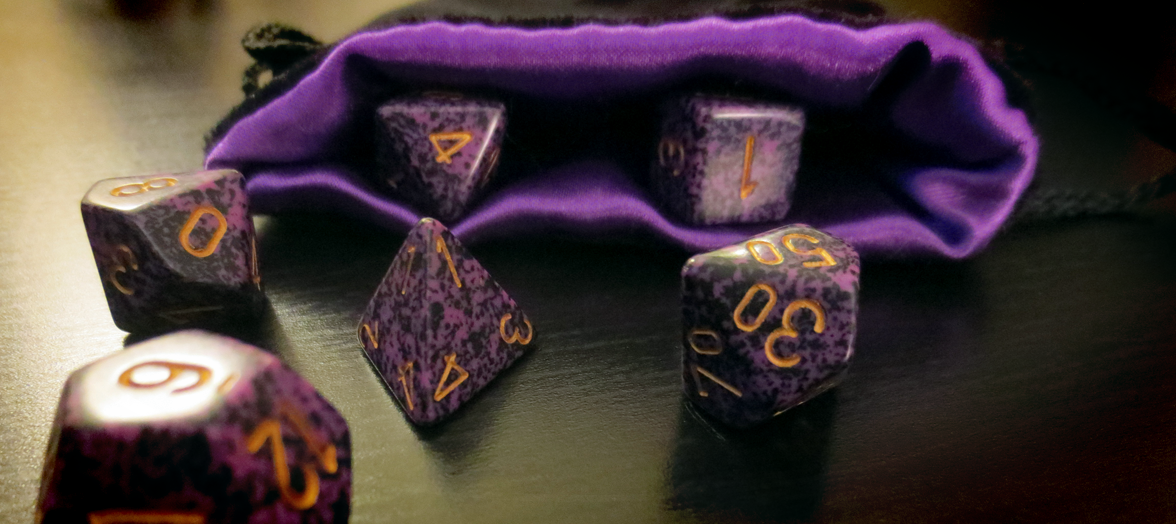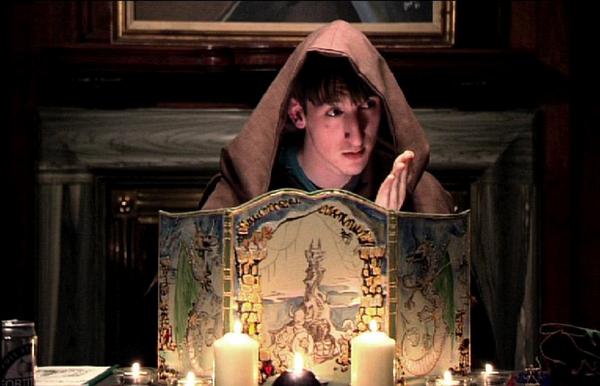 I’ve been a dice carrying geek since I was six. For those not familiar with games like Dungeons & Dragons, you sit around a table method acting. Each person assumes the role of a character, and one person is the game master. The game master helps the players interact with a shared, fictional world.
I’ve been a dice carrying geek since I was six. For those not familiar with games like Dungeons & Dragons, you sit around a table method acting. Each person assumes the role of a character, and one person is the game master. The game master helps the players interact with a shared, fictional world.
Being a game master offered an incredible opportunity to learn storytelling. Every day after school we’d get together, and my friends would expect me to weave a tale to entertain them.
I learned about plot, conflict, and characterization. Every game session honed my craft. I’d get immediate feedback, because it I used a lame story idea or trope, the players would tell me. This proved to be immensely powerful, because I was learning reader psychology without evening understanding what I was doing.

Years of careful observation taught me that different people played for different reasons. My friends fell into three specific play styles, which influenced the type of books they liked to read.
Those types are Tactical, Narrative, and Simulation.
Any given player valued all three types of play, but one of those types was usually much more dominant. Violate that, and that person would mentally check out of the story you were trying to tell.
So what are the three different styles?
Tactical
The first group played because they loved overcoming obstacles. Their characters possessed spells and abilities needed to overcome those obstacles, and the most fun they had was in figuring out how to do that.
They usually loved combat, but also enjoyed any area where they were able to use their character’s abilities to overcome something.
These players read novels with large battles and a lot of detailed tactical maneuvers, but found series like The Wheel of Time incredibly boring.
.
Narrative
Some of my friends loved story above all else. They wanted to know why they were questing to kill the dragon, why the baron betrayed them, and what the world had been like before the dwarves were wiped out.
These players cared about the characters. They wanted to know more about them, and their lives.
Narrative players were the most rare, and usually became game masters in their own right. Almost all of them loved to devour fantasy novels, especially long series with an overarching plot.
.
Simulation
This last type of player valued suspension of disbelief over all other considerations. They wanted to inhabit a living, breathing world. They wanted to know how the magic worked, how the politics of kingdoms worked, the life span of different races, and every other detail— both fantastic and mundane.
Inaccuracies or plot gaps drove players like these from the table. These players also loved to read, though they rarely became game masters. The books they preferred were well researched and true to life.
.
Why Readers Lose Interest
So what do these player types have to do with your readers?
Every reader has a different set of reasons for devouring books. Some are looking for raw escapism. Some want to experience a specific emotion. Some want to learn something.
If you violate their expectations you’ve just lost a reader. They demand a certain emotion and / or experience, and you’d better deliver.
A few weeks back I ran a game for some guys I’ve known since high school. They’re narrative players, and they wanted a narrative game. So I ran one, and they loved it.
My Saturday night Pathfinder game is full of tactical players. They don’t care what the dragon’s name is. How many hit points does it have, and how big is the cone for the breath weapon?
If you tried running a narrative game for those guys, they’d suddenly find somewhere else to be on Saturdays. Your readers are the same way.
How do you know what their expectations are? Research, just like I did in my weekly D&D games. You need to study the market the same way I studied my players. Yes, I’ve conveniently written a book about the topic for you over-achievers, but don’t worry. I’ll sketch the basics here.
.
Reader Psychology
Why do people read Stepbrother Billionaire Romance? How about Space Opera, or Cozy Mysteries? Those three groups will have radically different reasons for reading.
You need to understand what your readers expect before you start writing, so that the novel you write conforms to their expectations.
If you’ve already written a novel(s) and it isn’t selling, then you need to get it in front of people whose expectations match the kind of story you’re telling.
When I played D&D with my friends I knew the kind of game they enjoyed, so that’s what I ran. I sometimes gamed with different groups, and I tailored my style accordingly. That was easy, because they were real life friends.
It’s a little more challenging for a writer to learn about expectations, but definitely still possible. Here are three steps you can take to better understand your reader
.
1- Which books are the top of your chosen genre right now? What do their cover, blurb, title, and category tell you about who they might have been written for?
When I see a naked male torso I’m pretty sure I’m not the intended audience. But who is? I’m going to go out on a limb and say heterosexual women, or homosexual men.
If the blurb is about a woman meeting a sexy soccer star while on vacation odds are good I can rule out most of the homosexual men. That book is targeted at women, and I’d wager those women are looking for…wait for it…romance.
No matter what genre you’re examining, readers have reasons for loving it. Those reasons aren’t always the same, but you can almost always find patterns.
.
2- What do the reviews say? Look at the five star reviews, and the one star reviews. These are the ones whose expectations were either exceeded, or not met. Do the reviews have a common theme? What did people really like / dislike?
I did this exercise for one of my own books, No Such Thing As Werewolves. The one star reviews are all from simulationist type readers. They hated the inaccuracies, especially about guns and military hardware. Clearly, I violated simulationist expectations.
The five stars overwhelming mention how anthropology, helio-seismology, genetics, and history were all worked in. They loved how those things supported the story, and how all these seemingly unrelated events (a solar flare, an ancient culture returning, werewolves, Egyptian Gods) were all tied together.
These readers were narrative. They loved the plot, and overlooked a few inaccuracies.
.
3- Examine yourself. Why do you read? What experience are you seeking? What is your favorite book? What’s a book that you thought you’d love, but ended up hating? Why did you hate it? Which expectations were not met?
These answers should tell you a lot, both about yourself and your potential reader. Understanding how readers think is the fastest way to a sustainable career as a writer.
Very interesting commentary here, Chris. I played a lot of D&D in my younger days and I was thinking about the guys I played with while reading this. I think you’re really onto something here. (I realize now that I was mostly a narrative guy, though I liked the simulation part and I also enjoyed the problem-solving.) I think it’s important to understand where we each fit as a writer and where it is we are trying to take our readers. (I also now get why I found the Wheel of Time books so deadly boring but other people I know loved them!)
Thanks. You’ve given me something to think about.
Thanks for reading, Eric. I think anyone who gamed learned a ton from doing so, and it’s interesting considering how it’s changed us as writers. I’m mostly narrative, but I also love the simulationist and tactical angles. I need a mix of all three to really get me into a book I’m reading.
So maybe the answer is to have all three in our writing, but emphasize the facet that appeals to us most strongly? I don’t know. Just thinking out loud.
That’s it exactly! Have all three facets in everything you write, but make sure the strongest matches your target reader.
Good points, Chris.
If I’m reading fantasy, I tend to a blend of all three but the biggest key (for me) is dependent on what character(s) I’m following.
If I’m following a mage, yet the narrative is going off on a tangent of the political plot overtaking the king and never explains magic or even worse, uses it as a deus ex machina, I’m done with the story.
Likewise, if I’m reading about a Roman battle and the legionnaires charge haphazardly into battle en masse, I will question the author’s knowledge of what they are writing about.
I guess I could lean more towards “tactical” with the other two tossed in as appropriate!
I recently had a review that specified that I was very detailed in my battles and they enjoyed it. Looks like I targeted that book right in that case…
Interesting. I value all three styles in different ways, but I hadn’t considered how that might shift based on what character I’m playing.
I was always a narrative player. I think you’re right. That’s why I tended to want to DM instead of play.
For a short while my friends and I were into Earthdawn (anyone remember that?) and I played this smooth talking rogue who could charm his way out of anything. The DM had a great time listening to me talk my way out of being caught red-handed with some bit of treasure. The worst thing to happen to me was when I decided to add the “acting” skill to my character. The next time I had to talk my way out of something, my DM would say, “Why don’t you roll an acting check?”
I always found that frustrating. If you didn’t have the skill, you got to role-play. If you did, then just roll a die =p
Not a gamer, just popped in to say I’m on the second reading of Write To Market and loving it again. Thanks for writing it, much haze has gone from my eyes!
Awesome! I had a similar moment not long before writing the book. It all clicks and you suddenly realize what you were missing the whole time. =)
And thanks for turning me on to Domino Finn!
Great article Chris. As a former DM for various games (AD&D, Star Wars & Cyberpunk) I really identify with this. Whilst I never actually had the insight to learn my types of players like you have, looking back I can see they were all narration focused players.
As an aside too, actually being a DM is an excellent bit of foundation training for becoming a writer as it teaches world building, story telling, plot, conflict etc. True, most of us were no doubt heavily influenced by the novels around at the time but it still taught us valuable writing skills that I’d never actually considered until I’d read this article ☺
Excellent read, sir.
I completely agree about the other benefits of being a DM. I had almost 500 words about the other benefits, but cut it when beta readers told me it wasn’t relevant.
I’ll do a separate article about it, because I think DMs have a MASSIVE advantage when writing. We’ve spent years getting immediate feedback from players about what works and what doesn’t.
Are you still gaming much these days?
Hey Chris
Would definitely like to see the separate article on the benefits of being a DM for writers. Like you say, you get to see, immediately, what resonates with players and what drags. I think it’s a testament to the stories we played out that my friends and I still talk about some of the more memorable sessions we had (“remember when we “almost” survived Myth Drannor?!”)!
No actual gaming nowadays, the group are too far scattered geographically for it to work. Although a couple of the old group are actually beta readers for my work, which is a nice touch! 🙂
Reblogged this on Bum's Landing Memorial – Andrè Michael Pietroschek at WordPress.com and commented:
🙂